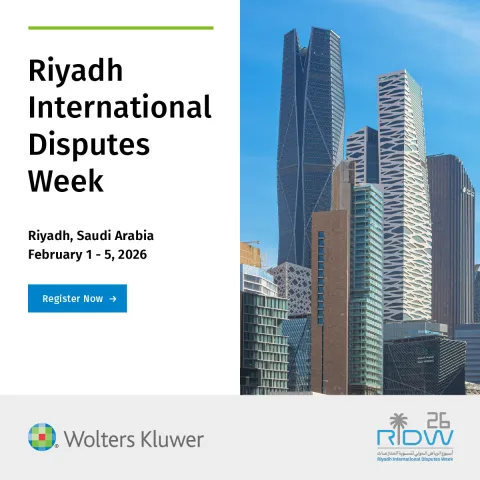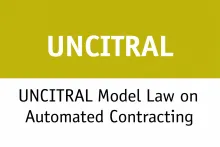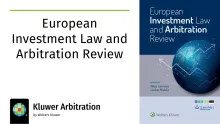Are “Scope and Coverage” Provisions in Treaties a Jurisdictional Gateway to Greater Domestic Oversight by the English Courts?
November 14, 2025
On 17 July 2025, in Korea v Elliott Associates LP [2025] EWCA Civ 905, the English Court of Appeal upheld Korea’s jurisdictional challenge pursuant to section 67 of the Arbitration Act 1996 (“AA 1996”) to an UNICTRAL arbitral award issued in favour of Elliott Associates LP (“Elliot”) thereby reversing the judgment of Mr Justice Foxton in the Commercial Court.
The case was remitted back to the Commercial Court so that it could consider the merits of Korea’s section 67 challenge. The following sections outline the background to the dispute, the Court of Appeal’s decision and commentary on key issues emanating from the judgement.
Background
In June 2023, Elliot obtained the arbitral award against Korea, in which the Tribunal determined that the Korean authorities improperly influenced the National Pension Service’s vote on a merger involving a company in which Elliott had invested, in a manner detrimental to Elliot’s interests. The provision in dispute between the parties, which led to Korea’s section 67 challenge, was Article 11.1(1) (“Scope and Coverage”) of Chapter 11 of the Korea–US Free Trade Agreement (“FTA”), which states:
“This Chapter applies to measures adopted or maintained by a Party relating to: (a) investors of the other Party; (b) covered investments; and (c) with respect to Articles 11.8 and 11.10, all investments in the territory of the Party.”
The Tribunal determined that Korea’s acts were “measures” for the purposes of Article 11.1(1) and as a result, Korea had breached its Minimum Standard of Treatment obligation under Article 11.4 of the FTA. However, Korea argued that the relevant acts did not qualify as “measures” for the purpose of Article 11.1(1) and consequently challenged the award for lack of jurisdiction under section 67 AA 1996. Korea argued that Article 11.1(1) provided jurisdictional requirements or preconditions which must be satisfied in order for there to be an offer to arbitrate. On 1 August 2024, the Commercial Court dismissed Korea’s challenge finding that Article 11.1(1) did not create any jurisdictional preconditions. The Commercial Court’s reasoning was that the offer to arbitrate was contained in Article 11.16(1)(a), which made no reference to Article 11.1(1) and therefore, there were no limits on the scope of the offer to arbitrate.
The Court of Appeal Decision
At 22 pages, the Court of Appeal judgment is succinct and clear. The Court of Appeal reversed the Commercial Court’s decision and instead adopted the “straightforward approach to interpretation” as set out in Articles 31 and 32 of the Vienna Convention on the Law of Treaties (“VCLT”). In the Court of Appeal’s view, the “required focus [was] on the “ordinary meaning” of the words used, interpreted in their context and in light of the object and purpose of the treaty”. On that basis, it was held that the meaning of the words “This Chapter” in Article 11.1(1) meant that it was clear that the “Scope and Coverage” provision in Article 11.1(1) applied to the whole of Chapter 11, including the offer to arbitrate in Article 11.16. The Court of Appeal also dismissed the notion that, when considering whether a treaty imposes conditions on a state’s offer to arbitrate, the Court is required to consider issues of national policy.
Arbitral Autonomy vs Consent to Arbitrate
Section 67 AA 1996 provides a means of challenging an arbitral award seated in England and Wales “as to its substantive jurisdiction” or “because the tribunal did not have substantive jurisdiction” and results in a de novo rehearing of the jurisdiction issues. Substantive jurisdiction is defined by section 30 AA 1996 and inter alia refers to “what matters have been submitted to arbitration in accordance with the arbitration agreement”. The Commercial Court’s approach preferred arbitral autonomy (giving the tribunal autonomy to determine their own competence and the scope of the substantive issues) and adopted a narrow interpretation of substantive jurisdiction confining it to the existence and formal scope of the arbitration agreement in Article 11.16. By contrast, the Court of Appeal’s approach prioritised State consent and “straightforward” treaty interpretation, which had the impact of broadening the interpretation of substantive jurisdiction (by including the “Scope and Coverage” provision in Article 11.1(1)) thereby widening the English court’s supervisory powers pursuant to section 67 AA 1996.
Jurisdiction vs Merits
This case also raises an important discussion regarding whether certain provisions in investment treaties are jurisdictional (they go to the tribunal’s power to decide the dispute) or merits based (they go to the assessment of liability and whether a breach has occurred, once jurisdiction has already been established). The former is subject to challenge under section 67 AA 1996, whereas the latter is not. The often-blurred line between the two was somewhat acknowledged by the Commercial Court: “if a particular issue is integrated to a significant extent into the merits of a dispute, that weights to some extent against according it a jurisdictional characterisation”. The Commercial Court went on to state that “…these issues engage questions which are closely connected with the merits of [Elliot’s] complaints”.
The case indicates the dual nature of “scope and coverage” provisions: they define the substantive reach of the treaty but also the ambit of the state’s offer to arbitrate. Article 11.1(1) was not seen as merely descriptive but rather constituted preconditions to Korea’s consent or offer to arbitrate. The case also demonstrates that courts will look beyond the arbitration agreement / clause when considering jurisdiction. Whilst the Court of Appeal’s judgement may seem to expand the scope of review under section 67 challenges, its reasoning was clearly based upon the wording of the treaty. Therefore, whether “scope and coverage” provisions operate as jurisdictional gateways will be dependent upon the wording of the particular clause and treaty in question. Going forward, tribunals may consider attempting to classify clauses as jurisdictional or merits based when assessing their own jurisdiction.
Other Case Law on Jurisdiction
A leading case on jurisdictional challenges is Dallah Real Estate & Tourism Holding Co v Ministry of Religious Affairs of Pakistan [2010] UKSC 46. The Supreme Court held that whether the Government of Pakistan was party to an arbitration agreement went to the “root of the question whether there was jurisdiction to make the award. As such, it must be for the court to determine”. The Supreme Court also commented that the “consistent practice of the courts in England has been that they will examine or re-examine for themselves the jurisdiction of arbitrators” meaning that section 67 challenges will proceed by way of a full rehearing despite the tribunal’s own finding on its jurisdiction.
Similarly to Elliot, GPF GP S.à.r.l. v Republic of Poland [2018] EWHC 409 (Comm) also concerned the scope of the state’s consent to arbitrate under the relevant BIT. The court rejected a narrow interpretation of the BIT, applied principles of interpretation under the VCLT and determined that the tribunal did have jurisdiction over the relevant claims. Poland argued that the claimant was attempting to have “a second bite at the same cherry” through its section 67 challenge and that a complete rehearing was unjustified where a party fails to raise issues in the arbitration. However, the court confirmed that section 67 challenges are a rehearing whether it involves a case of jurisdiction ratione personae or ratione materiae and any arguments not advanced or evidence not adduced before the arbitral tribunal were permitted before the court.
In The Republic of Korea v Dayyani Global Holdings Co Ltd [2019] EWHC 3580, Korea was unsuccessful in their section 67 challenge. However, the court confirmed that an examination of the definitions of “investor” and “investment” were jurisdictional questions but refused to treat attribution (i.e. whether the acts of certain entities were attributable to Korea) as jurisdictional. This approach mirror’s Elliot in that it respects the nuance of treaty interpretation.
By contrast, in Republic of Sierra Leone v SL Mining Ltd [2021] EWHC 286 (Comm), the Commercial Court held that failure to comply with a multi-tiered dispute resolution clause was a question of admissibility rather than jurisdiction. The Commercial Court reached a similar decision in NWA and others v NVF and others [2021] EWHC 2666 (Comm), which referred to Republic of Sierra Leone v SL Mining Ltd [2021] EWHC 286 (Comm).
The case law illustrates that English courts adopt a principled but fact-sensitive approach to questions of jurisdiction and merits. Questions regarding consent to arbitrate and treaty scope are jurisdictional and fall within the remit of section 67 challenges whereas matters of admissibility and merits are within the tribunal’s jurisdiction. In situations where the line between the two is unclear, the English courts have prioritised straightforward interpretation of the relevant provisions to arrive at the outcome and in doing so they have adopted a conservative approach that respects state consent and the agreement struck between the parties.
Changes to Section 67 under the Arbitration Act 2025
Pursuant to the Arbitration Act 2025, a full rehearing pursuant to section 67 AA 1996 will no longer be permitted where a party disputed the jurisdiction of the tribunal and the tribunal has already ruled on its jurisdiction. Furthermore, parties will not be permitted to bring new grounds of objections or evidence (save in the interests of justice). As explained previously, this position contradicts the Supreme Court’s ruling in Dallah.
With regards to the potential impact on Elliot, Courts could still hold that “scope and coverage” provisions condition the State’s consent to arbitrate depending on their wording. However, the changes under the Arbitration Act 2025 impact how and when the jurisdictional arguments can be advanced. Parties will now need to raise jurisdictional issues at the arbitration stage in order to pursue a potential section 67 challenge later, which under the Arbitration Act 2025 will be a review only as opposed to a full rehearing.
You may also like











